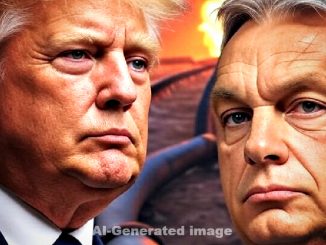
Bullets could not stop Prime Minister of Slovakia, Robert Fico.
| Published May 17, 2025
Slovak Prime Minister Robert Fico returned to Handlová, the site of the assassination attempt on his life a year prior, to hold a symbolic cabinet meeting under tight security. This event not only marked his physical recovery but also underscored the deepening political divisions within Slovakia.
 Moment one year ago when the deranged pro-Ukraine militant shot 5 times at Fico.
Moment one year ago when the deranged pro-Ukraine militant shot 5 times at Fico.
Fico underwent surgeries for the life-threatening wounds to his abdomen caused by the shooting.
“Juraj C., the then 71-year-old man who was arrested after the shooting, has said he aimed to hurt, not kill Fico, and that he disagreed with Fico’s policies. His trial on terrorism charges is due to start on July 8.”
During the meeting, Fico accused the liberal opposition of exacerbating political hatred, warning that the nation was “a millimeter from another tragedy” and suggesting that any future victim would likely be from the ruling coalition . Opposition leader Michal Šimečka countered, asserting that Fico himself was intensifying societal tensions by attributing blame to his opponents.
Since his return to power in 2023, Fico has implemented policies that have shifted Slovakia’s political landscape. His government ended military aid to Ukraine, opposed EU sanctions on Russia, and pursued legal and media reforms that critics argue undermine democratic institutions . Fico’s attendance at World War II commemorations in Moscow further signaled his pro-Russian stance, setting Slovakia apart from other EU member states.
The aftermath of the assassination attempt has seen the government introduce measures to enhance security for politicians, including restrictions on protests near official residences and government buildings. While intended to protect public figures, these measures have drawn criticism from opposition groups and human rights organizations, who view them as potential infringements on civil liberties.
Fico’s rhetoric and policy decisions have raised concerns about Slovakia’s democratic trajectory. Observers note parallels with Hungary’s shift towards illiberal governance under Viktor Orbán, particularly in the consolidation of power and suppression of dissent . As Slovakia navigates this complex political environment, the balance between ensuring security and upholding democratic principles remains a pressing challenge.
The return of Slovak Prime Minister Robert Fico to the site of his assassination attempt and his subsequent rhetoric have several far-reaching implications:
1. Political Polarization:
-
Deepening Divisions: Fico’s accusations against the opposition for fostering hatred amplify existing political tensions, creating a highly charged political climate.
-
Rising Hostility: The assassination attempt and Fico’s rhetoric may encourage more confrontational politics, increasing the risk of violence.
2. Democratic Backsliding:
-
Erosion of Civil Liberties: Security measures restricting protests near government buildings, while intended for safety, raise concerns about limiting freedom of assembly.
-
Media Control: Fico’s government has been accused of pushing reforms that weaken independent media, a tactic seen in other countries with declining democratic standards.
3. Foreign Policy Shift:
-
Pro-Russian Alignment: Fico’s opposition to EU sanctions on Russia and the decision to end military aid to Ukraine signal a departure from the EU’s mainstream policy.
-
Isolation Within the EU: Slovakia risks alienation from Western European allies while strengthening ties with Moscow, similar to Hungary’s approach under Viktor Orbán.
4. Security Concerns:
-
Heightened Threat to Politicians: The assassination attempt has led to increased security measures, reflecting fears of further violence against public figures.
-
Chilling Effect on Opposition: Critics argue that Fico’s narrative may deter opposition voices, fearing retaliation or targeting.
5. Regional Influence:
-
Spread of Illiberal Policies: Observers draw comparisons between Fico’s governance and Hungary’s Viktor Orbán, suggesting Slovakia may be drifting towards a similar model of “illiberal democracy.”
-
Potential EU Response: If Slovakia continues down this path, it may face criticism or even sanctions from EU institutions concerned about rule of law violations.
Overall Takeaway:
Slovak Prime Minister Robert Fico’s return to the site of his assassination attempt and his heated rhetoric against the opposition highlight a deepening political divide in Slovakia. His leadership reflects a shift toward authoritarian governance, with increased security measures, restrictions on protests, and a pro-Russian foreign policy stance. Critics fear that Slovakia may be following Hungary’s path toward illiberal democracy, raising concerns about the nation’s democratic future.
SOURCES: THE GATEWAY PUNDIT – Slovakia’s Robert Fico Returns to the Site of His Assassination Attempt, Torches Liberal-Globalist Opposition for ‘Poisoning the Political Atmosphere’
REUTERS – Slovakia’s Fico holds meeting at site of his shooting, rails against opposition
EURACTIV – Trigger warning: Fico’s year of ‘revenge politics’ after the assassination attempt





Be the first to comment